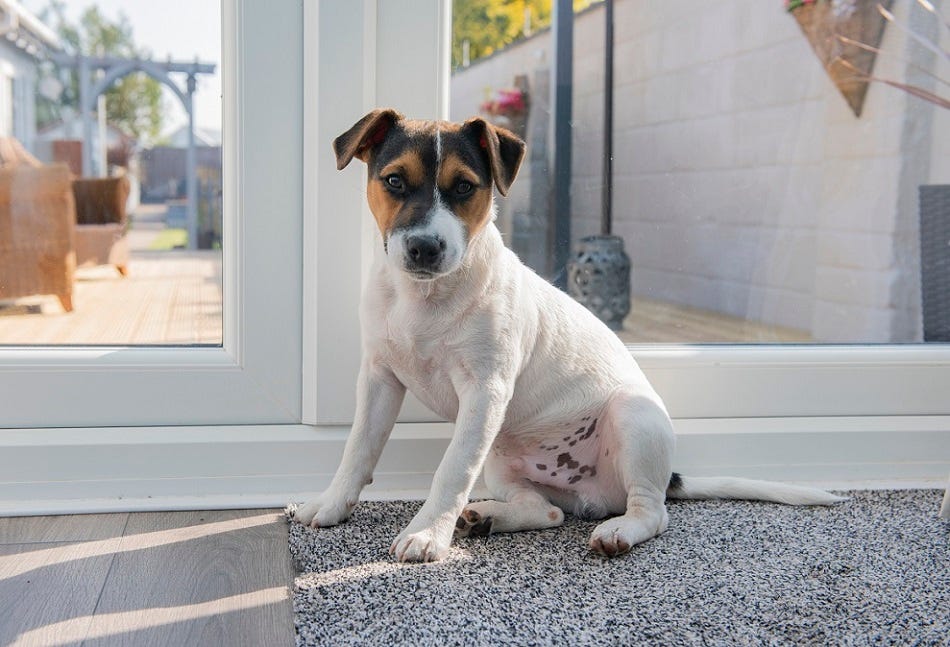There’s no denying that house training a puppy can be a delicate process. Instilling lifelong habits in your pup requires patience, consistency and positive reinforcement, but potty training puppies to go outside (or on designated fake grass mats for apartments) can be messy without a little help.
Save yourself the cost of carpet cleaning and endless washing with our guide to puppy training - your pooch will be toilet trained in no time.
When to start training your puppy
House training a dog should start as soon as your pup bursts through the front door. In terms of age, experts recommend that you start house training your puppy when they're between 12 and 16 weeks. At this age, they should be able to have enough control of their bladder and bowel movements to hold it when required.
If you begin puppy training a little later on in life, you might need more patience. Re-training an older dog to eliminate outside may take longer while you teach them new behaviours.
How to house train a puppy
House training puppies is all about routine. Just as a regular schedule teaches them the times to eat and play, house training is all about teaching your pup when it’s time to do their business.
- Keep them confined to a specific room, crate or area on a leash. As they learn to do their business outside, you can begin to give them more freedom to roam about the house.
- Keep the puppy on a regular feeding schedule and take away their food between meals. Keep an eye on how much water they’re drinking as well.
- Take them out first thing in the morning and then try and take them outside every 30 minutes to an hour. Normally pups can hold their bladder for up to two hours, but try not to go any longer than this; otherwise, they're likely to have an accident.
- Take the puppy to the same spot every time you take them out to do their business. When they use the area frequently they’ll begin to get used to their scent and will be prompted to go.
- Continue to stay with them outside, until they’re housetrained.
- Be sure to shower your pup with plenty of praise and treats to reinforce their good behaviour when they eliminate outside.
You may find handy tools like crates or pens can also help you house-train your pup.
Signs that your pup needs to go outside
While you should keep your pup on a schedule, you can also keep a lookout for key signs that your puppy needs to eliminate, including:
- Whining
- Circling
- Sniffing
- Barking
- Scratching at the door.
Take your pup outside pronto if you notice them doing any of these behaviours to save yourself cleaning up an accident.
Puppy toilet training tips
- Try and avoid punishing your puppy and responding negatively to any accidents. Instead of teaching them, your pup will only learn to fear you.
- If you catch them eliminating inside, clap your hands loudly but then gently take them outside. When they are finished, praise them and give them a treat.
- Try and stay outside a little longer. At first, it might look like they don’t need to eliminate but instead they may just be exploring the outside area.
- When cleaning up accidents try to avoid an ammonia-based cleaner. Instead, opt for an enzymatic cleanser that will help minimise odours and stop your pup from returning to the spot.
If you find that your pup isn’t responding to your at-home toilet training, or you need a little more help with puppy training, we’re here to help.
FAQ:
What age can you start training a puppy
House training should start anywhere between 12 and 16 weeks. Any younger and your pup might not be able to learn how to control their bladder.
How do I reward my puppy?
When your doggo successfully eliminates outside or in their designated area make sure to reinforce their good behaviour with plenty of happy words, treats and pats. If they make a mistake and have an accident inside, avoid using disciplines like rubbing their nose in it.
What happens if I need to leave the house?
Just because you leave the house, it doesn’t mean training has to stop. Instead, encourage your pup to go before you leave. Then, confine them to a small area of the house. You can either use a pen, gate or even a crate. Place down puppy training pads to encourage them to go in specific areas if they need to.
Be prepared for a mess when you get home - especially if you’re gone for a long period of time (more than a couple of hours).




